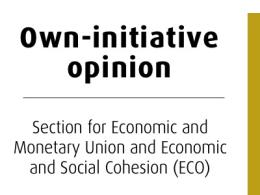European Economic
and Social Committee
Climate change is an existential threat and an economic opportunity for the EU
In a recent set of recommendations adopted in October, the European Economic and Social Committee (EESC) called for immediate measures to combat climate change, while highlighting the economic opportunities it also presents. By investing in sustainable practices and promoting a collaborative global approach, the EU can mitigate the risks associated with climate change.
Over the past four years, the European Union has grappled with a series of formidable challenges, including the COVID-19 pandemic, ongoing military conflicts and the escalating threat of climate change. These issues not only threaten economic stability, but also raise urgent concerns about the future resilience of EU infrastructure, agriculture and public health. Without decisive and immediate action, the cost to tackle climate change will be very high. The preliminary data indicates annual costs of EUR 600 billion from 2024 to 2030.
EESC rapporteur Juraj Sipko highlighted that ‘while the costs of inaction are immense, the transition to a low-carbon economy offers unprecedented potential for innovation, growth and global leadership’.
In order to meet the EU’s 2030 climate and energy objectives, the transition must be managed carefully, focusing on social fairness, financial stability and international cooperation.
Immediate action required
In its opinion, the EESC stressed the need for immediate measures to mitigate and adapt to climate change, including emission reductions, carbon pricing (like the EU emissions trading system) and carbon taxes to discourage pollution. The committee warned that the costs of inaction far outweigh those of prompt investment in these initiatives. Failing to act may cause EU countries to slip further in the global economy rankings in terms of share of global GDP (which dropped from 25% to 18% between 2005 and 2023).
Economic opportunities amid challenges
Despite these obstacles, the EESC views the fight against climate change as a historic opportunity for technological innovation and economic growth. Investments in renewable energy, energy efficiency, the circular economy and clean mobility can stimulate growth while reducing emissions. This transition may lead to significant structural changes in the economy, which could have significant impacts not only on the shape of economic and social systems, but also on the way in which they operate. Although this shift requires substantial capital, it promises increased productivity and resource efficiency, enhancing the EU’s competitiveness and resilience.
Incentives and regulation
To facilitate this transition, the EESC advocates a mix of ICT tools, incentives and regulatory measures. ICT would improve communication on climate action and enhance operational efficiency. Financial instruments, policies and instruments like the EU’s emissions trading system, as well as climate-friendly tax instruments and a taxonomy system could foment public acceptance of climate measures. However, key indicators must be legally binding, with sanctions for non-compliance, in order to ensure that progress remains on track.
Labour market transformation and social fairness
The transition to a green economy will significantly affect the labour market, requiring workers to acquire new skills . Lifelong learning and vocational training are crucial for preparing the workforce for emerging green jobs. However, without careful planning, this shift could exacerbate unemployment and social inequalities. The EESC insists that climate action prioritize social fairness and establish safety nets for those affected, while encouraging social dialogue.
Global cooperation and economic competitiveness
As climate change is a global challenge, the EESC calls for coordinated international efforts. In order to strengthen the competitiveness of the EU economy, the EESC stresses the need to monitor developments in the centres of economic power and in other highly dynamic emerging economies. Strengthening the EU’s economic position would involve focusing on sectors that can thrive in a low-carbon economy.
Addressing inflation and financial stability
The EESC acknowledges that climate change can lead to inflation, slowed economic growth and a damaging fall in living standards. A well-prepared economy is better equipped to handle these risks. Effective climate action can help reduce inflationary pressures by promoting sustainable sectors. Furthermore, the EESC points out that in addition to public funds, there are significant volumes of private financial resources available that could be used to finance an appropriate response to climate change, while adhering to strict financial prudential rules.
Our message is clear: while climate change poses significant challenges, it also presents unique opportunities for the EU. By taking decisive action now, the EU can transition to a low-carbon economy that fosters innovation, growth and global leadership, all while ensuring social fairness and financial stability.

